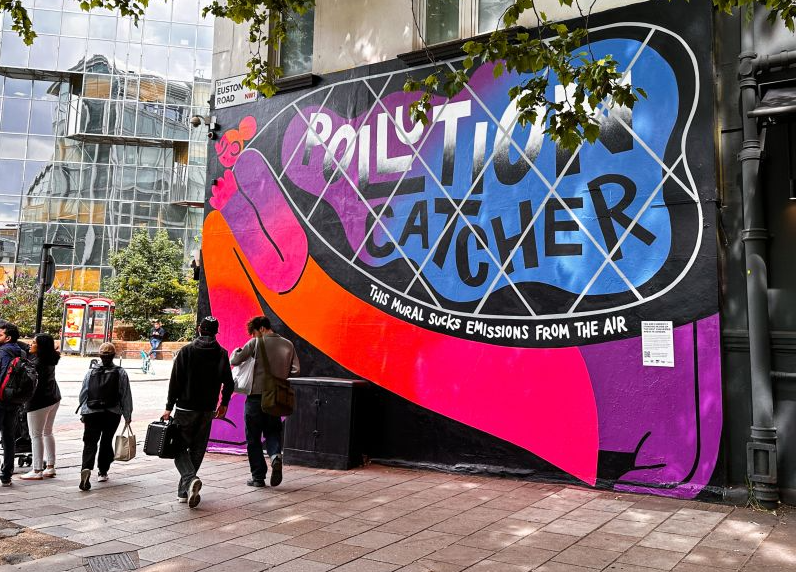The Euston Road, one of London’s most polluted areas, recently saw an initiative by advertising company Dentsu aimed at improving air quality.
Commissioned by environmental charity Global Action Plan for Clean Air Day on June 20, the mural featured a woman catching fumes in a net, painted with a special material that supposedly converts pollutants into “harmless salts.”
“Air pollution impacts every organ in the body and is the biggest environmental threat to health,” read a Dentsu webpage for the campaign titled “This Campaign Sucks.”
New research by DeSmog reveals that in the past five years, Dentsu and its subsidiaries have held at least 27 contracts with 25 different fossil fuel companies, including Shell, ExxonMobil, and BP.
In May, Clean Creatives awarded Dentsu the satirical “Excellence in Science Fiction” award for promoting controversial carbon capture projects for Chevron.
Campaigners argue that Dentsu’s air-purifying mural is a case of double standards, highlighting that many advertising companies are praised for green campaigns while promoting fossil fuel interests. Fossil fuel burning causes over 60 percent of an estimated 8.3 million global air pollution deaths annually, according to a 2023 study in the British Medical Journal.
“If Dentsu was genuinely committed to clean air, it wouldn’t promote multiple polluters,” said anti-advertising campaigner Andrew Simms. “You can’t claim credit for a minor technological fix while aiding major pollution.”
Earlier this month, United Nations Secretary General Antonio Guterres called for advertising agencies to cease working for fossil fuel companies. “Stop taking on new fossil fuel clients from today,” he said in New York.
Vanishing Act
When the mural launched on June 13, Dentsu’s Instagram account encouraged the public to share pictures with the hashtag #thiscampaignsucks, describing the mural as “pollution-catching art.”
On June 24, the mural’s webpage still described it as “live,” urging people to visit. However, upon investigation, the mural had been painted over in black. Local sources indicated it had been on display for less than two weeks.
Notably, there was no reference to Dentsu’s 25 fossil fuel clients on its global website.
‘A Cynical Game’
Dentsu has worked on various climate and sustainability campaigns, including the “Zero Malaria: Change the Story” campaign and with the Global Energy Alliance for People and Planet.
“Advertising agencies are as able as oil companies to use greenwash,” said Simms. “Environmental organizations need to avoid working with agencies that have conflicts of interest.”
Global Action Plan director Nicky O’Malley said they were “delighted” to work with Dentsu on the project, according to Marketing Beat. However, Victoria Harvey, a sustainability researcher at the University of East Anglia, questioned the choice of partnering with a company that works with fossil fuel clients.
Global Action Plan CEO Sonja Graham stated their Clean Air Day campaign aimed to reduce air pollution by promoting greener transport. “We have a policy against working with companies that extract fossil fuels, but it does not currently extend to service providers,” Graham said. “We are interested in reviewing what DeSmog has uncovered.”
In September, global communications group Havas faced criticism for taking on a contract with Shell despite numerous climate pledges. The Fossil Fuel Nonproliferation Treaty terminated its contract with Havas following the news.
‘No Room for Compromise’
Dentsu’s website states there is “no room for compromise” on climate action and aims to reach net zero by 2040. However, it continues to promote oil and gas companies, which is not accounted for in its net-zero plan.
In July 2023, Dentsu published an estimate of the “advertised emissions” caused by its campaigns. This shows the increase in carbon emissions from consumer actions post-advertising, such as buying a plane ticket after seeing an ad. These emissions were 32 times higher than those from Dentsu’s day-to-day operations.
Currently, these advertised emissions are not integrated into Dentsu’s net-zero plan, and the company continues to run oil and gas advertising campaigns from its solar-powered offices.
This article was published alongside the addition of Dentsu to DeSmog’s Advertising and Public Relations Database, where you can browse research on advertising and PR industry firms that have created greenwashing campaigns.
Original Story at www.desmog.com
